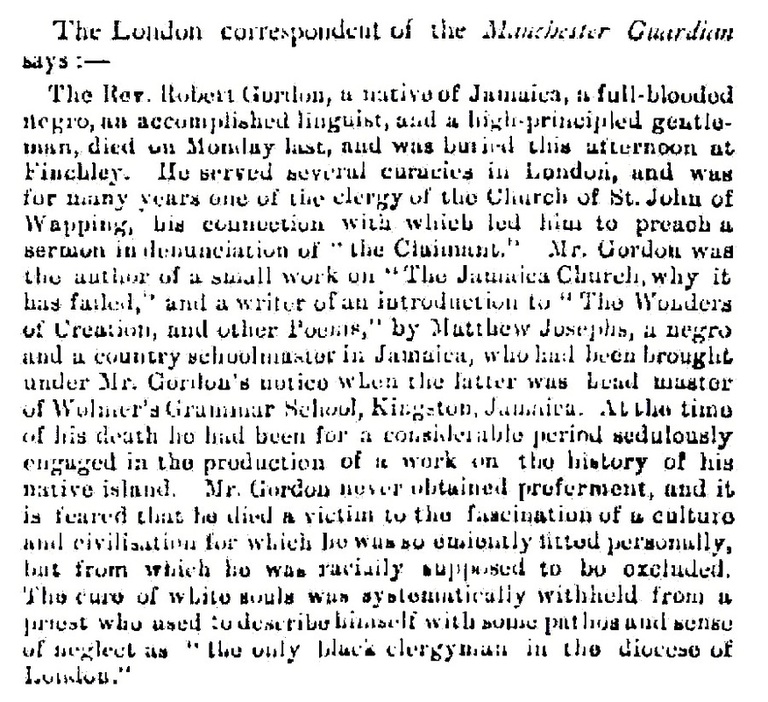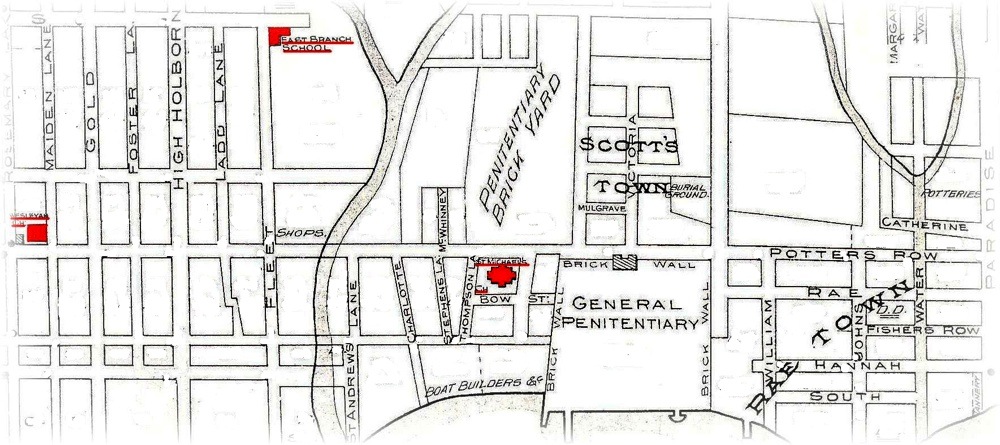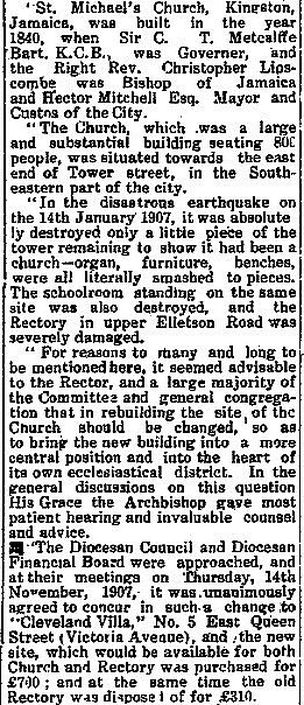Rev. Robert Gordon
Robert Gordon is the earliest example of a Black Jamaican clergyman in the Church of England in the island.
Church Review, April 2, 1885, p160.
in Jamaica, 1836-58
In a letter written in January 1868, Robert Gordon gave a brief account of his background and upbringing:
'I am a native of Jamaica, and of pure African blood. My parents were natives of the same place - my mother was a well-educated, pious, amiable woman, who, although dead for nearly a quarter of a century, yet the grateful remembrance of her Christian character cannot but be specially endearing to me - She was a Methodist, and so was my father - They both did everything in their power to make me follow the denomination to which they were attached - But finding that my religious sympathies were with the Church of England, to which I was instinctively inclined, they eventually permitted me to follow my own path.'
Robert Gordon was born in 1836, presumably in Kingston. His parents, as good Methodists, were probably members of either Coke Chapel on East Parade or even more likely Wesley Chapel on Tower Street.
'I am a native of Jamaica, and of pure African blood. My parents were natives of the same place - my mother was a well-educated, pious, amiable woman, who, although dead for nearly a quarter of a century, yet the grateful remembrance of her Christian character cannot but be specially endearing to me - She was a Methodist, and so was my father - They both did everything in their power to make me follow the denomination to which they were attached - But finding that my religious sympathies were with the Church of England, to which I was instinctively inclined, they eventually permitted me to follow my own path.'
Robert Gordon was born in 1836, presumably in Kingston. His parents, as good Methodists, were probably members of either Coke Chapel on East Parade or even more likely Wesley Chapel on Tower Street.
|
Robert Gordon also wrote of his early contacts with the Church of England.
'There is a Church in Kingston, St Michael's, into which I used to stroll every evening when returning from school, whilst it was being built, at the consecration of which, though a boy of only about 10 years, I vowed to devote myself to the ministry of the Church of England, and in which, in after years, I frequently preached.' Robert Gordon did not identify the school he attended, but since he later taught at East Branch Church of England School, it is possible he had been a pupil there. His walk home took him past St Michael's Church, so it is possible that the family lived in Rae Town, where Black Kingstonians had bought house plots in the early 19th century. [early 19th century Rae Town] |
Daily Gleaner, May 8, 1908
|
I, therefore, became a Catechist at the age of 17, and determined to educate myself for the position.
(letter January, 1868)
(letter January, 1868)
|
Bishop's Book No 4 page 169 (Jamaica Archives)
Robert Gordon: Licensed as Catechist and Lay Reader, Highgate District, St Catherine, April 4 1853 |
In the same 1868 letter, Robert Gordon gave his account of his unsuccessful attempts to enter the priesthood of the Church of England between 1853 and 1858:
'I had to undergo difficulties of a most extraordinary character, yet I presented myself for examination on arriving at the canonical age of 23 - As it has ever been the policy of the Jamaica Church to exclude the black man from preaching the gospel, obstacles were ever after studiously raised to prevent the realization of my object. - The wrongs and injuries done me, because I did not feel disposed to expatriate myself to Africa, must ever be remembered by me with anything else but pleasure - I persevered for years, and, finally, as the Bishop of Kingston, who was afraid of offending his Clergy by the ordination of a Negro, would neither say Yes, nor No to my being admitted to the Diaconate, I quitted the country for England, where I arrived in the early part of 1858, with the view of obtaining Deacon's orders from the Bishop of London.'
Notes:
1. If Robert Gordon was 17 in 1853, as suggested by the Bishop's Book entry, he would not have been 23 until 1859;
2. There is no indication of the education which would have been necessary to prepare him to become an ordinand;
3. By leaving Jamaica in 1858 he seems to have indicated a level of impatience which other young men in his position eschewed; for instance, Robert Love in the Bahamas (born 1835 or 1839), a contemporary of Gordon, did not give up his hopes there until the late 1860s.
'I had to undergo difficulties of a most extraordinary character, yet I presented myself for examination on arriving at the canonical age of 23 - As it has ever been the policy of the Jamaica Church to exclude the black man from preaching the gospel, obstacles were ever after studiously raised to prevent the realization of my object. - The wrongs and injuries done me, because I did not feel disposed to expatriate myself to Africa, must ever be remembered by me with anything else but pleasure - I persevered for years, and, finally, as the Bishop of Kingston, who was afraid of offending his Clergy by the ordination of a Negro, would neither say Yes, nor No to my being admitted to the Diaconate, I quitted the country for England, where I arrived in the early part of 1858, with the view of obtaining Deacon's orders from the Bishop of London.'
Notes:
1. If Robert Gordon was 17 in 1853, as suggested by the Bishop's Book entry, he would not have been 23 until 1859;
2. There is no indication of the education which would have been necessary to prepare him to become an ordinand;
3. By leaving Jamaica in 1858 he seems to have indicated a level of impatience which other young men in his position eschewed; for instance, Robert Love in the Bahamas (born 1835 or 1839), a contemporary of Gordon, did not give up his hopes there until the late 1860s.
Bishop Courtenay gave his account of the situation in relation to Robert Gordon in 1853-8 in a circular to the clergy in 1861 after Gordon's return to the island:
KINGSTON, APRIL 22, 1861
.... The case of Mr. Gordon has often received my most serious consideration. Since I entered this Diocese in 1853, it has been my desire and endeavor, as Examining Chaplain, as Lecturer in Theology, and as Bishop, at once to raise the standard of qualifications in Holy Orders, and to encourage youthful candidates for the Ministry wheresoever they could be found if apparently pious and sincere. Against Mr. Gordon I had no personal prejudice [whatever?]. I was very far from insensible of the advantages I should acquire, by proving myself superior to all prejudices and by assisting merit in its efforts to rise, and, in fact, I have, in more instances than one, rather gone beyond others than to be behind them in the measure of encouragement I was disposed to give Mr. Gordon. But had Mr. Gordon conducted himself wisely, he might, without any assistance from me, have been now, for many years, engaged in the work of the Ministry. In 1853, if not sooner, he applied for Ordination to the Bishop of Jamaica. For this he was utterly in competent, but the Bishop offered him a Missionary Studentship in Codrington College, Barbados, where he might have qualified himself for most important services under the West Indian Church Association for the Propagation of the Gospel in West Africa. But this systematic preparation , and this arduous labor, - in which the present Principal of Codrington College , the truly devoted Christian Mr. Rawle, was, with difficulty, restrained from sacrificing himself, was, by Mr. Robert Gordon, disdainfully rejected. He, nevertheless, reiterated his applications for admission to the Ministry; and was not altogether discouraged by me, though I had grave doubts concerning him; and though he had forfeited all claim to special indulgence, by his refusal to undergo a regular training. Such encouragement as he did obtain from me proved unfortunate, since, under the apprehension caused by a groundless report that I was about summarily to ordain him, the inhabitants of the district of Highgate, St Catherine, where he had long been known, and had acted as a Catechist, addressed to me, - in 1857 – a very energetic protest, based principally on certain immoralities of his, which had caused scandal in the district. Another report to the same effect, being raised, as I believe, designedly, during my first visitation of the Bahamas, was made the ground of what I must designate a violent agitation and an excitement so widely prevalent, fostered too by an influential journal, that I found it necessary to contradict the report [ illegible]. Bearing these occurrences in mind, I shall not attempt to conceal my surprise that the Bishop who was made the object of general indignation in consequence of the false report that he intended to Ordain Mr. Gordon, should now be asked to give effect to his Ordination, by the Bishop of a remote Diocese, scarcely a year afterwards. Shortly after this strong exhibition of opinion Mr. Gordon proceeded to England, and obtained an appointment under the Colonial Church and School Society at “London” in Western Canada, a place of concourse for refugees from Slavery in the United States. After, I believe, about [illegible] months, he was admitted to Deacon's Orders, and a year afterwards to Priest's Orders, by the Bishop of Huron; remaining still in charge of the same mission.
in England and Canada, 1858-60
in Jamaica, 1860-67
in England, 1867-85
Reynold’s Newspaper, March 29, 1885, p 4
Again, what is the Church doing for even its own members? It is notorious that curates are the poorest-paid class of men in the community. The rectors and vicars who are mostly poor relations of their patrons, appropriate the great bulk of the Church’s revenues, and the curates, who do all their work, are left to starve or half-starve. No later than last week a curate, the Rev. Robert Gordon, died at Middlesex Hospital from the effects of starvation. He had been connected with the diocese of London for twelve years, was a person of great accomplishments (he could preach in either French, German or English), and was a man of irreproachable character; but because his skin was dark (he was descended from a Zulu chief), no one would employ him, and he died for want of food. When this is the way the Church treats its own members, what possibly can the nation at large expect at its hands? It is an institution rotten to the very core, and we, therefore, heartily join with the members of the Liberation Society in desiring its abolition, and the appropriation of its revenues to other and more beneficial purposes.
Again, what is the Church doing for even its own members? It is notorious that curates are the poorest-paid class of men in the community. The rectors and vicars who are mostly poor relations of their patrons, appropriate the great bulk of the Church’s revenues, and the curates, who do all their work, are left to starve or half-starve. No later than last week a curate, the Rev. Robert Gordon, died at Middlesex Hospital from the effects of starvation. He had been connected with the diocese of London for twelve years, was a person of great accomplishments (he could preach in either French, German or English), and was a man of irreproachable character; but because his skin was dark (he was descended from a Zulu chief), no one would employ him, and he died for want of food. When this is the way the Church treats its own members, what possibly can the nation at large expect at its hands? It is an institution rotten to the very core, and we, therefore, heartily join with the members of the Liberation Society in desiring its abolition, and the appropriation of its revenues to other and more beneficial purposes.
Note on sources:
Dr Robert J Stewart's research on the Rev Robert Gordon, done while he was in Jamaica and studying at the University of the West Indies in the the 1980s, has been one of my sources. However, I would date some of the events of Gordon's life differently from Dr Stewart, and have a somewhat different interpretation of some of those events. Joy Lumsden
Religion and Society in Post-Emancipation Jamaica, Robert J Stewart
Dr Robert J Stewart's research on the Rev Robert Gordon, done while he was in Jamaica and studying at the University of the West Indies in the the 1980s, has been one of my sources. However, I would date some of the events of Gordon's life differently from Dr Stewart, and have a somewhat different interpretation of some of those events. Joy Lumsden
Religion and Society in Post-Emancipation Jamaica, Robert J Stewart





